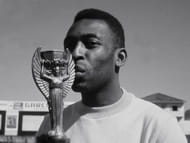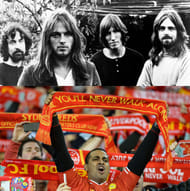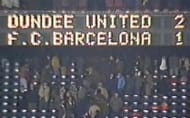Football – ‘The Beautiful Game’ is a phrase that is known and used by millions of fans around the world. But who gave the world’s favourite sport such a fitting name? Well, that is something that not many of us know.The man who is said to have called football ‘The Beautiful Game’ for the first time is a Brazilian footballer who goes by the name Edson Arantes do Nascimento, also known as Pelé.Pelé named his autobiography My Life and the Beautiful Game and the book's dedication reads: "I dedicate this book to all the people who have made this great game the Beautiful Game."There are plenty of such stories and facts about the game and its players that we love, live for and worship. Over the years, we have heard or read about many of them, but the history of football is so vast, that there will still be plenty left to know even for the most knowledgeable fans.
#1 Ronaldo played in the 1996 summer Olympics with Ronaldinho written on his back

Ronaldo Luiz Nazario de Lima was part of the Brazil squad that won the World Cup in 1994 at the age of 17. But he came to be known as Ronaldinho (which means ‘Little Ronaldo’ in Portuguese) because Ronaldo Rodrigues de Jesus, his older teammate, was also called Ronaldo and was nicknamed Ronaldao (which tranlsates to ‘Big Ronaldo’).
In the 1996 Olympics, where Brazil won the bronze medal, Ronaldo played with the name Ronaldinho on his shirt since Ronaldo Guiaro, who was two years senior to him, was one of his teammates.
Three years later another Brazilian player with the name Ronaldo (full name: Ronaldo de Assis Moreira) joined the Brazilian national team, but by then, Ronaldo Nazario was the only other person with the same name in the squad. Therefore, Ronaldo Moreira was called Ronaldinho Gaucho and even today the whole world fondly calls him by the name Ronaldinho.
#2 Fernando Torres is the only player to have scored in 7 different competitions in one season

Fernando Torres was the ‘The Prodigy of Atletico Madrid’, ‘The hero of Liverpool’ and later, the ‘The flop of Chelsea’. But in the 2012/13 season, that ‘flop’ set a record that no one else has been able to match.
Torres scored at least one goal in the FA Community Shield, Premier League, UEFA Champions League, FIFA Club World Cup, Capital One Cup, FA Cup and the UEFA Europa League. The only competition in which he played for Chelsea that season and didn’t score was the UEFA Super Cup.
The previous record holder was Torres’ compatriot Pedro, who scored in six different competitions during the 2009/10 season.
It is highly unlikely that the record set by Torres will be broken by another player, as the club needs to achieve a very difficult combination as mentioned below.
The club should win the League or League Cup in the previous season to qualify for the League’s Super Cup.
The club should win the UEFA Champions League in the previous season so as to qualify for the UEFA Super Cup and the FIFA Club World Cup.
The club should be in a league with two different cup competitions (like in England).
The club should exit the Champions League in the group stage by finishing third and then play in the UEFA Europa League.
If the above-mentioned criteria are met, then the player still has to score in seven different competitions, of which two competitions have only one game each for the player to complete the feat in.
#3 Pele is the youngest ever World Cup winner

In 1958, an unknown teenager named Pele travelled with the mighty Brazilian squad for the World Cup in Sweden. But he made his World Cup debut against USSR in only the third match of the first round as he was sidelined with an injury when he arrived for the tournament.
Aged just 17 years and 235 days, he was the youngest player at the tournament and at that time, the youngest player ever to play in a World Cup. But this is a rather insignificant record in comparison to the ones he set later in the tournament.
Pele scored the only goal of the game against Wales in the quarterfinals, becoming the youngest goal-scorer in the World Cup. Later in the semifinal against France, he scored a hat-trick and became the youngest in World Cup history to do so.
On 19 June 1958, the Brazilian became the youngest player to feature in the World Cup final and he crowned that achievement with two goals, the first of which was later selected as one of the best goals in the history of the tournament.
Brazil won their first World Cup that year and Pele was the revelation of the tournament as he was named the Best Young Player of the tournament as well as the second best overall.
Of all the records Pele set in his debut World Cup, only one has been broken so far and that was the one for being the youngest player at the tournament. Norman Whiteside of Northern Ireland is the current holder of that record and he set it when he played against Yugoslavia in 1982.
It goes without saying, however, that no World Cup winner has been as young as Pele was when Brazil won the 1958 edition.
#4 Gianfranco Zola is the only player to be sent off in the World Cup on his birthday

Former Chelsea player Gianfranco Zola is a lucky player. The Italian made his World Cup debut as a substitute against Nigeria in 1994 on the day of his birthday and the referee decided to give him a gift – a red card. Oh wait; maybe he isn’t that lucky after all.
The worst part was that he got sent off for a foul that didn’t even deserve a yellow card. The player he fouled, Augustine Eguavoen, went down like a pack of cards to probably get Zola sent off and another teammate of his, Sunday Oliseh, rushed to the spot as if Eguavoen was hit by a truck.
Maybe the referee had good intentions in his mind and he wanted Zola to go home early and celebrate his birthday.
The 10 minute cameo Zola played against Nigeria was his only appearance in the World Cup as he was not played in any of the remaining matches even after completing his suspension, and he was not picked for the 1998 World Cup either.
It’s probably not a good idea to wish Zola on his birthday.
#5 Jari Litmanen is the only footballer to play international football in four different decades

Jari Litmanen is arguably the greatest Finnish player to have graced the game of football. Litmanen, or Litti as he is called in Finland, had an illustrious playing career that went on from 1987 to 2011, during which he played for top European clubs like Ajax, Barcelona and Liverpool.
For a man whose career was marred by injuries and therefore never reached its true potential, the Finn did great to play professional football across four different decades; he is among the very few men to have done so. But Litmanen is the only player to have played international football in four different decades.
He made his debut on 22 October 1989 against Trinidad and Tobago and later served as the team captain between 1996 and 2008. On 19 January 2010, he played for Finland against South Korea and set his unique record before retiring from international duties later that year with a goal in his last game.
Litmanen’s record is another one which is unlikely to be broken by anyone, as most players today retire from international football quite early with the objective of prolonging their club careers.
#6 Sir Alex Ferguson was once fired for swearing at a lady

In his entire managerial career Sir Alex Ferguson was fired only once; Scottish club St. Mirren have the distinction of being the club that fired one of the greatest managers of all time.
The official version is that Alex Ferguson was sacked for various breaches of contract including unauthorised payments to players. After he was sacked by St. Mirren, he took them to an industrial tribunal and was counter-accused of intimidating behaviour towards his office secretary because he wanted players to get some expenses tax free.
Ferguson reportedly blanked her for six weeks, confiscated her keys and communicated only through a 17-year-old secretarial assistant. The tribunal concluded that Ferguson was "particularly petty" and "immature".
St. Mirren chairman, Willie Todd, said that Sir Alex Ferguson had no managerial ability. Well, we all know how that turned out.
#7 Pink Floyds song Fearless ends with Liverpool fans singing Youll Never Walk Alone

Remember that band from the 70s and 80s which produced brilliant progressive rock songs like Another Brick in the Wall or Hey You or Comfortably Numb? The one with five long-haired dudes? Yes, I am talking about the one and only Pink Floyd.
In 1971, the band released a song named Fearless. Near the beginning and the end of this beautiful song, there is a field recording of Liverpool fans singing ‘You’ll Never Walk Alone’ superimposed over the music. Towards the closing seconds of the song, it is even possible to hear the fans chanting ‘Liverpool’.
Sadly, there is no verified explanation as to why exactly Pink Floyd used this recording in the song. So the only possible way to find out is to ask one of the three living members of the original five, namely, Nick Mason, Roger Waters and David Gilmour.
Skip to 0:23 and 4:40 of the video below to hear the chants by Liverpool fans.
#8 Manchester Uniteds existence was once saved by a dog

Manchester United is easily one of the most recognised sporting teams in the world. Their popularity extends to even the most remote corners of the world. Today, Manchester United is a brand recognized by millions of people of people around the globe, but what many of the fans don’t know is that had it not been for the intervention of a dog over a century ago, the club could have easily been non-existent.
At the turn of the century, the club’s parlous finance was of bigger concern than its below par performances and facilities. The situation worsened when their club president, William Healey, approached the court to issue a winding up order for the money the club owed him. This would have served as the final nail in the coffin.
The club’s debt amounted to £2,500 pounds (which was quite significant then) and with no benefactor in sight, the court declared the club bankrupt.
It was during this dire situation that the club found its saviours in Harry Stafford and his St. Bernard, Major. Harry Stafford was the club’s skipper and cared deeply about the club’s existence even before the crisis had hit. He used to send his St. Bernard around the Bank Street ground on match days to collect donations to run the club.
After the winding up order was issued Staffod begged and borrowed enough money to arrange for the club’s next game away to Bristol City. However, for the club to save itself, a much bigger amount was needed and for this a four-day fundraising event was held in Manchester at which Stafford’s dog, Major, was a major attraction.
Legend goes that at the end of the fourth day, the dog ran away and entered a local pub in which John Henry Davies, the owner of a flourishing local brewery was present. Davies’ daughter fancied the dog and its ownership was tracked back to Stafford.
So one of the most important meetings in the history of Manchester United took place under accidental circumstances, and Stafford convinced Davies to invest in the club and clear off its debts.
Manchester United have never had to endure any hardship similar to the one they had in 1902, and the fact is that they survived it due to the acts of a dog. There is even a book by the name “The Lost Dog that saved Manchester United” based on this remarkable incident.
#9 Dundee United have defeated Barcelona in all four of their matches

As shocking as it may sound, European giants Barcelona have never beaten Scottish club Dundee United in four attempts. In fact, Dundee have a 100% win record against Barcelona in official games.
Before Barcelona’s crushing defeat against Bayern Munich in the semifinal of the Champions League in 2013, the last time they lost both legs of a European tie was way back in 1987 and their nemesis on that occasion was Dundee. The Scots are also the only British club to have achieved this rare feat.
The first time these two teams met was 20 years before Barcelona’s defeat in 1987. The sides met in the Inter-Cities Fairs Cup, with Dundee winning the first leg at home 2-0 and the away leg 2-1.
When these two sides met in 1987, it was in the quarterfinal of the European Cup (now known as the UEFA Champions League). Dundee won the first leg 1-0 and were trailing the second leg by the same scoreline. But with extra time looming on a cold night at the Nou Camp, they scored two late goals – in minutes 85 and 89 – to inflict a fourth straight defeat on the Catalans.
Interestingly Barcelona’s strikers on that night were current Stoke City manager, Mark Hughes and former Tottenham star, Gary Lineker.
#10 Stoke City goalkeeper Asmir Begovic holds the Guinness record for the longest goal

It’s rare for a goal keeper to score goals, but to score one and enter the Guinness Book of records for the goal is simply remarkable.
On 2nd November 2013, when Stoke City were hosting Southampton in a Premier League game, Begovic attempted a clearance after the ball was passed to him seconds after the game kicked off. In windy conditions at the Britannia Stadium, the ball bounced outside the Southampton penalty box and flew over Begovic’s opposite number Artur Boruc and into the net.
The Guinness book of world records recognised the 91.9 metre strike as the longest goal scored in football.
Despite scoring for the first time in his career, Begovic didn’t celebrate his goal as he said he felt a bit bad for Boruc. "It is a long ball that got caught in the wind and it took a wicked bounce. It's not nice to be on the receiving end of those things as a goalkeeper.”
Hats off to Begovic for the goal, and the way he reacted (or didn’t) after scoring it!
